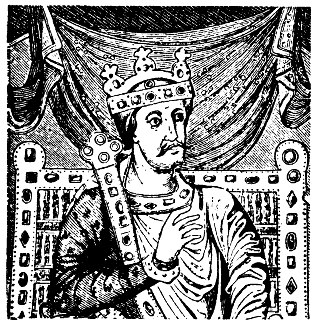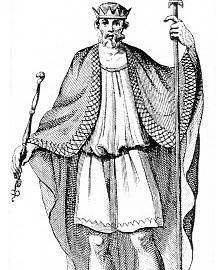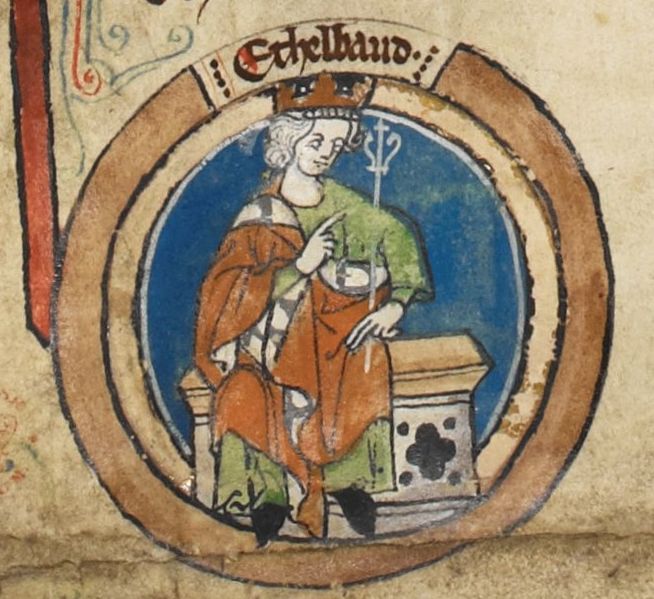While I was refreshing my memory about Alfred the Great last week, I rediscovered something interesting that you might enjoy. This week I’ll tell you about Judith, but there is not as much information available about her as there is about Alfred.
Alfred’s father, Aethelwulf (795, or maybe 806 – 858), was a warrior against the invading Vikings, but was also a deeply religious man. Alfred twice traveled to Rome to meet with the Pope, the second time with his father when Alfred was six years old. On the journey home to Wessex in 856, they stayed several months with Charles the Bald (823-877), King of West Francia, King of Italy and eventually the Holy Roman Emperor. Charles was having his own issues with Viking attacks and the two leaders agreed to form a diplomatic alliance.

Charles the Bald. After a dedicational image in Codex aureus in Regensburg, written year 870 by his command.
Charles’s oldest child, Judith (843? – unknown), is reported to have been anywhere from 12 to 14 years old at the time of Aethelwulf’s visit. Aethelwulf was in his fifties. Please take a second to think about that when I tell you that these powerful men agreed that Judith would marry Aethelwulf and move to Wessex. Charles did require that Judith be crowned queen, which was against Anglo-Saxon tradition. The king’s wife was normally just known as the king’s wife.
There are many theories among scholars about the purpose of this marriage. Aethelwulf had plenty of heirs, although none with the prestige of a great-granddaughter of Charlemagne. Whatever the reason, she did have an effect on events in Wessex. Aethelwulf’s son Aethelbald was in charge of things in Wessex while his father was away. Upon hearing of his father’s marriage, Aethelbald decided he didn’t want to return power to his father and any possible offspring from this more prestigious second wife. Rather than engage in civil war with his son, Aethelwulf split the kingdom, allowing Aethelbald to rule the more profitable piece.
Aethelwulf died two years into his marriage with Judith with no issue. Possibly for the same reasons as his father, Aethelbald married Judith without waiting the standard twelve month mourning period for women. There was criticism of Aethelbald’s marriage to his stepmother, which was seen by many as incestuous. Alfred’s biographer, Asser, had nothing good to say about Aethelbald, but none of that stopped the marriage. Yes, it’s good to be king. Except that Aethelbald also only lasted two years and also died having no children with Judith.
At this point in 860, twice a queen and twice widowed while still a teenager, Judith sold her lands in England and moved back to her father. Charles promptly installed her in a nunnery, possibly while he tried to arrange another suitable and advantageous marriage for her.
But Judith apparently had other ideas. One year after Aethelbald’s death, she escaped, probably with the aid and consent of her brother, Louis, who would later become the king known as Louis the Stammerer. She eloped with Baldwin, who would later become the Count of Flanders.
Charles was unhappy with his daughter, threatening anyone who gave shelter to the runaways, and having the bishops excommunicate them. In response, Judith and Baldwin traveled to Rome to plead their case before Pope Nicholas I. Their plea was successful, they were allowed to return to the church, and Charles was forced to accept their marriage.
Judith finally had children with Baldwin. Her oldest son, Baldwin II (864? – 918), married the youngest daughter of Alfred the Great in 884, meaning that Judith was Alfred’s stepmother, sister-in-law, and mother-in-law to his daughter. And that’s the last we know of Judith.
I have questions that are unanswered with current records. How did she meet Baldwin while ensconced in a nunnery? There is no record of Baldwin prior to his marriage to Judith, not even any record of the identity of his parents. Was this a love match? Was Judith worried about who her father would pick as her next husband and taking what little control she felt she could? Was Baldwin more interested in Judith’s rank than in Judith?
I also have frustrations because I am unable to finish the story. There is no record of when Judith died, although we know the dates of the deaths of all three of her husbands. Was she alive in 884 to arrange the marriage of her son to Alfred’s daughter? Her date of death is often listed as 870, but I think that is simply because her last son was born in 869 and there are no records of her doing anything after that. All that we know about her is in relation to the men in her life; her father, her husbands, her brother, her sons.
What I do know is that I’m really glad I didn’t live in the ninth century.



